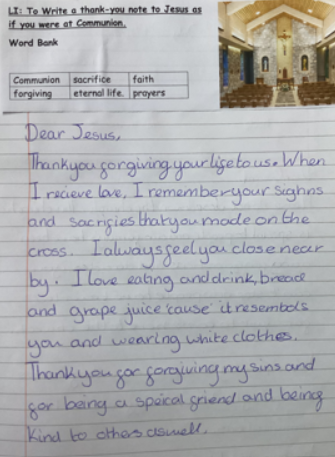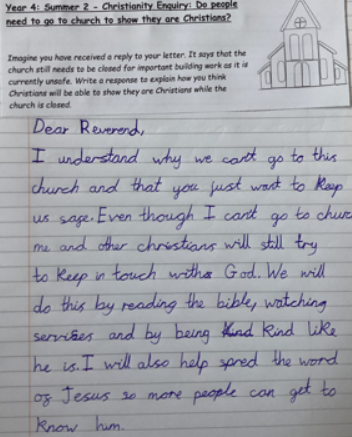RE at Portsdown Primary School and Early Years
Religious Education in Portsdown Primary School and Early Years follows the Portsmouth, Southampton, Hampshire and IOW Agreed Syllabus for RE, which is entitled ‘Living Difference IV’. The agreed syllabus follows the legal requirement for religious education to reflect the fact that the religious traditions in Great Britain are in the main Christian, while taking account of the teachings and practices of the other principal religions represented in Great Britain.
We teach Living Differences IV through the ‘Discovery RE scheme’. Information about the scheme can be found here: https://discoveryschemeofwork.com On this page, you will also be able to find a mapping document which shows how Living Differences IV is taught through the ‘Discovery RE’ scheme.
“Living Difference IV affirms our commitment to an education that takes seriously the importance of children and young people exploring their own lives in relation to what it can mean to live with a religious orientation on life, as well as other ways of life including those informed by a non-religious perspective. It gives guidance to teachers regarding what religious education should aim to achieve during their time in school so that children and young people come to speak, think and act in the world.” (Living Difference IV)
For more information and detail about the RE agreed syllabus ‘Living Difference IV’, please follow the link.
(St. Paul's Church: looking for reference to Easter in the church.)
RE Curriculum Design
Discovery RE is an enquiry-based approach to Religious Education running from Nursery to Year 6 with a different enquiry for every half term (6 per year) focusing on one religion at a time. These overlapping themes and enquires allow the children to revisit and develop their knowledge and understanding over time. The aim is to deepen children’s critical thinking skills through greater subject knowledge and also to allow their own spiritual development. Each enquiry has a big enquiry question and this is explored with a 4-step process:
- Engagement (How can I relate to the underpinning concept in my own world?)
- Investigation (What do I need to learn about the religion in order to answer the big question)
- Evaluation (How well can I apply this knowledge to the big question using critical thinking/evaluation skills?)
- Expression (Can I express what difference this enquiry has made to me, my thinking and my starting point?)
End of year expectations (EYEs) are included in the syllabus and are used to inform curriculum making; both in terms of what should be taught, as well as to ensure appropriate challenge over time. In Year R and the Nursery, RE is taught to support the children’s “Personal, Social and Emotional Development” and “Understanding the world” elements of their development (see below for more details).
During Reception and Key Stage 1, Children look at aspects of the Christian tradition along with a depth study of a second tradition (see below for more information about EYFS including Year R).
During Key Stage 2, Children look in more depth at aspects of the Christian tradition along with in-depth studies of two additional religious traditions.
Non-religious perspectives are also explored in the RE lessons.
The teaching and learning methods of Religious Education is planned to employ a wide range of teaching methods including:
- Visits to places of worship.
- Exploring Religious artefacts.
- Listening to religious stories.
- Visits by members of faith communities.
- Reflection on religious symbols, sounds and the use of silence.
- Art, music, dance, including concerts and performances.
- Experiential learning through drama.
- RE is a delivered through a process of enquiry into concepts. This allows children to develop skills such as critical thinking.
- Another really valued part of religious education is the children themselves sharing about their own religion, as the other children respond really well to hearing from their peers.


Religious Education (RE) in the Early Years Foundation Stage (EYFS): the Nursery and Year R
During the EYFS, children will have opportunities to develop the pre requisite skills for RE, through continuous provision and adult planned teaching. particular within the areas of Personal, Social and Emotional Development and Understanding the World.
Within the provision at Portsdown Primary School and Early Years, the children in EYFS will be supported to develop positive attitudes about the differences between people and valuing themselves as individuals, recognising that they too are part of a community/communities. They will also begin to recognise that people have different beliefs and celebrate special times in different ways.
They will be enabled to develop a positive sense of themselves and others, and learn how to form positive and respectful relationships. They will have opportunities to understand similarities between themselves and others, within families, the school community, and other cultures and traditions.
EYFS Statutory Framework
How you can support your child at home
Having regular discussions about your own beliefs, as well as those of friends and other family members is really important. It is important for children to come into contact with different members of community to see how their religious views impact their life. We live in a diverse city with so many amazing experiences and events based around different religious festivals and celebrations.
School RE Overview
Living Difference IV document
Discovery RE mapping document
RE Progression of Skills
RE Subject Leader Report
Right to withdraw a child from all or part of RE
Parents/carers have a right to withdraw their child from RE
The school will grant requests from parents/carers to withdraw their child, wholly or partly, from:
- Receiving religious education (RE) given in the school in accordance with the school’s basic curriculum
- Attendance at religious worship in the school
This is set out in section 71(1) of the School Standards and Framework Act 1998.
Parents/carers don’t have to give a reason
However, the school will work closely with the parents/carers to ensure they’re “aware of the RE syllabus and that it is relevant to all pupils and respects their own personal beliefs”.
The school will also give parents/carers the opportunity to discuss our RE curriculum with us, so that they can make an informed decision.
This is explained in non-statutory guidance on RE in English schools (pages 27 to 29).
Providing an alternative to RE lessons
The school has a duty to supervise any pupils who have been withdrawn from RE, but not to:
- Provide additional teaching that is not RE
- Incur extra cost
The school will not ask parents/carers to supervise their children if they’re withdrawn from RE.
The school will consider alternative arrangements for providing RE of the kind the parent/carer wants the child to receive. This is provided for in law, under section 71(3) of the School Standards and Framework Act 1998 for maintained schools.
This might involve:
- Providing the relevant RE at the school
- Sending the pupil to another school that provides suitable RE, if practical
- Withdrawing the pupil from school for a “reasonable period of time” to attend external RE
This is explained on page 28 of the non-statutory guidance.
Trips to places of worship
Parents/carers have a right to withdraw their child from any trip that is part of the RE curriculum.
In this instance, the school will meet with any concerned parents/carers to:
- Explain what will happen on the trip, and how it links to the pupil’s learning
- Invite the parent/carer to attend the trip
- Explain any adverse effects on the pupil of not attending the trip, e.g. not getting the opportunity to visit a new place they might not experience otherwise
The school will also explain our responsibility to foster good relations between individuals from different cultures and backgrounds, and show how this fits into the curriculum scheme of work. This is in keeping with the Equality Act 2010.
The school may decide to contact our local authority’s (LA’s) local standing advisory council on religious education (SACRE) organisation.
 Portsdown Primary School & Early Years
Portsdown Primary School & Early Years
